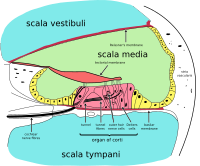
Photo from wikipedia
BACKGROUND Many hearing-impaired patients carry mutations in rare or novel genes undetected in regular genetic hot regions/genes screening. METHODS We collected clinical and genetic data from subjects with hearing loss… Click to show full abstract
BACKGROUND Many hearing-impaired patients carry mutations in rare or novel genes undetected in regular genetic hot regions/genes screening. METHODS We collected clinical and genetic data from subjects with hearing loss who visited our department for genetic counseling. Next-generation sequencing was conducted after 154 deafness-related genes were captured using a designed genes panels in 14 unrelated families (37 participants). The results were filtered and assessed with in silico tools, in combination with pedigree mapping. RESULTS Ten mutations in regular deafness genes (GJB2, SLC26A4) and uncommon genes (OTOF, MYO7A, MYO15A, and KARS) were detected, which constituted 57.2% of yielded rate. In particular, two patients with nonsyndromic deafness carried biallelic KARS mutations. In addition, we identified an unreported digenic mutational inheritance in GRP98/USH2A genes in a proband with isolated hearing loss. Functional analyses and molecular modeling suggested the damaging consequence of these variants on encoded proteins. According to the variant pathogenicity guidelines, the 17 identified variants in total were classified as "pathogenic" or "likely pathogenic." CONCLUSION The candidate mutations in deafness genes were suggested to be co-segregated in at least 57.2% of the studied pedigrees. This is the new report of rare/novel mutations causing inherited hearing loss in Chinese.
Journal Title: Molecular genetics & genomic medicine
Year Published: 2022
Link to full text (if available)
Share on Social Media: Sign Up to like & get
recommendations!